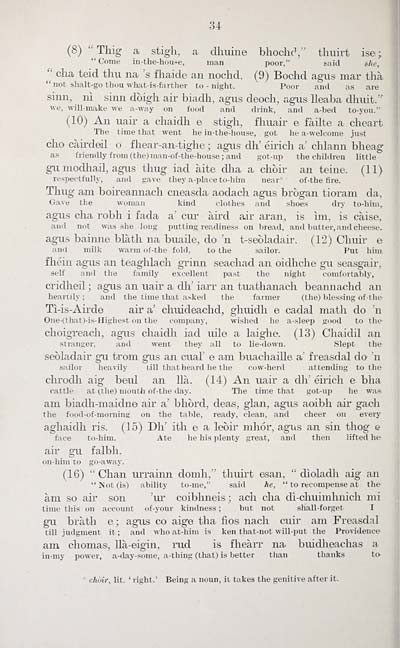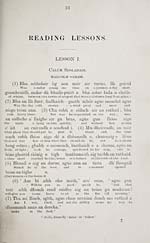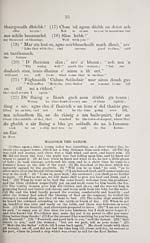Download files
Complete book:
Individual page:
Thumbnail gallery: Grid view | List view

3i
(8) "Tliig a stigh, a cUuiine bliochci," tliuirt ise ;
" Come iii-the-lmu-e, man poor," siiid f/ie,
" cha teid thu na 's fhaide an nochd. (9) Bochd agus mar thcà
" not shalt-go thou what-is-farther to - night. Poor anil as are
siun, 111 sinn dòigli air biadli, agus deocli, agiis lleaba dhuit."
we, will-make we away on food and drink, and a-bed to-you."
(10) All uair a cliaidli e stigh, fliuair e fàilte a cheart
The time that went he in-the-house, got he a-welcome just
clio càirdeil o fhear-an-tighe ; agus dh' eirich a.' chlann bheag
as friendly from (the) man-of-the-house; and got-up the children little
g-u modhail, agus thug iad aite dha a choir an teine. (11)
respectfully, and gave they a-place to-him near " of -the lire.
Thug am boireaniiach cneasda aodach agus brògan tioram da,
Gave the woman kind clothes and shoes dry to-him,
agus cha robh i fada a' cm' aird air aran, is im, is càise,
and not was she long putting readiness on bread, and butter, and cheese.
ag-us baimie blàth na buaile, do 'n t-seòladair. (12) Chuir e
and milk warm of-the fold, to the sailor. Put him
fheiii agus an teaghlach grinn seachad an oidhche gu seasgair,
self and the family excellent past the night comfortably,
cridheil ; agus an uair a dh' iarr an tuathanach beannachd an
heartily ; and the time that asked the farmer (the) blessing ofthe
Ti-is-Airde air a' chuideachd, ghuidh e cadal math do 'n
Oiie-(that)-is-Highest on the company, wished he a-sleep good to the
choigreach, agus chaidh iad uile a laighe. (13) Chaidil an
stranger, and went they all to lie-down. Slept the
seòladair gu trom gus an cual" e am buachaiUe a' freasdal do "n
sailor heavily till that heard he the cow-herd attending to the
chrodh aig beul an llà. (14) An uair a dh' eirich e bha
cattle at (the) moutli of-the day. The time that got-up he was-
am biadh-maidne air a' bhord, deas, glan, agxis aoibh air gach
the food-of-morning on the table, ready, clean, and cheer on every
aghaidh ris. (15) Dh' ith e a leòir mhor, agiis an sin thog e
face to-hira. Ate he his jtlenty great, and then lifted he
air gu falbh.
on-him to go-away.
(16) "Chan lUTaimi donih," thuirt esan, " dioladh aig an
"Not (is) ability to-me," said he, " to recompense at the
am so air son 'ur coibhneis; ach cha di-chuimhnich mi
time this on account of-your kindness ; but not shall-forget I
gu bràth e; agus co aige tha fios nach cuir am Freasdal
till judgment it; and who at-him is ken that-not will-put the Providence
am chomas, llà-eigin, laid is fheàrr na buidheachas a
in-my power, a-daysome, a-thing (that) is better than thanks to
choir, lit. ' right.' Being a noun, it takes the genitive after it.
(8) "Tliig a stigh, a cUuiine bliochci," tliuirt ise ;
" Come iii-the-lmu-e, man poor," siiid f/ie,
" cha teid thu na 's fhaide an nochd. (9) Bochd agus mar thcà
" not shalt-go thou what-is-farther to - night. Poor anil as are
siun, 111 sinn dòigli air biadli, agus deocli, agiis lleaba dhuit."
we, will-make we away on food and drink, and a-bed to-you."
(10) All uair a cliaidli e stigh, fliuair e fàilte a cheart
The time that went he in-the-house, got he a-welcome just
clio càirdeil o fhear-an-tighe ; agus dh' eirich a.' chlann bheag
as friendly from (the) man-of-the-house; and got-up the children little
g-u modhail, agus thug iad aite dha a choir an teine. (11)
respectfully, and gave they a-place to-him near " of -the lire.
Thug am boireaniiach cneasda aodach agus brògan tioram da,
Gave the woman kind clothes and shoes dry to-him,
agus cha robh i fada a' cm' aird air aran, is im, is càise,
and not was she long putting readiness on bread, and butter, and cheese.
ag-us baimie blàth na buaile, do 'n t-seòladair. (12) Chuir e
and milk warm of-the fold, to the sailor. Put him
fheiii agus an teaghlach grinn seachad an oidhche gu seasgair,
self and the family excellent past the night comfortably,
cridheil ; agus an uair a dh' iarr an tuathanach beannachd an
heartily ; and the time that asked the farmer (the) blessing ofthe
Ti-is-Airde air a' chuideachd, ghuidh e cadal math do 'n
Oiie-(that)-is-Highest on the company, wished he a-sleep good to the
choigreach, agus chaidh iad uile a laighe. (13) Chaidil an
stranger, and went they all to lie-down. Slept the
seòladair gu trom gus an cual" e am buachaiUe a' freasdal do "n
sailor heavily till that heard he the cow-herd attending to the
chrodh aig beul an llà. (14) An uair a dh' eirich e bha
cattle at (the) moutli of-the day. The time that got-up he was-
am biadh-maidne air a' bhord, deas, glan, agxis aoibh air gach
the food-of-morning on the table, ready, clean, and cheer on every
aghaidh ris. (15) Dh' ith e a leòir mhor, agiis an sin thog e
face to-hira. Ate he his jtlenty great, and then lifted he
air gu falbh.
on-him to go-away.
(16) "Chan lUTaimi donih," thuirt esan, " dioladh aig an
"Not (is) ability to-me," said he, " to recompense at the
am so air son 'ur coibhneis; ach cha di-chuimhnich mi
time this on account of-your kindness ; but not shall-forget I
gu bràth e; agus co aige tha fios nach cuir am Freasdal
till judgment it; and who at-him is ken that-not will-put the Providence
am chomas, llà-eigin, laid is fheàrr na buidheachas a
in-my power, a-daysome, a-thing (that) is better than thanks to
choir, lit. ' right.' Being a noun, it takes the genitive after it.
Set display mode to: Large image | Transcription
Images and transcriptions on this page, including medium image downloads, may be used under the Creative Commons Attribution 4.0 International Licence unless otherwise stated. ![]()
| Early Gaelic Book Collections > Hew Morrison Collection > How to learn Gaelic > (46) |
|---|
| Permanent URL | https://digital.nls.uk/79790691 |
|---|
| Description | A selection of items from a collection of 320 volumes and 30 pamphlets of literary and religious works in Scottish Gaelic. From the personal library of Hew Morrison, the first City Librarian of Edinburgh. |
|---|
| Description | Selected items from five 'Special and Named Printed Collections'. Includes books in Gaelic and other Celtic languages, works about the Gaels, their languages, literature, culture and history. |
|---|

